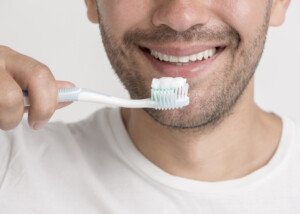There are five changes that occur to our teeth and overall oral health due to aging.
But there are things you can do about these unwelcome changes.
Hair turns gray or disappears altogether, waistlines expand and wrinkles form.
Just as our bodies undergo changes as we age, our mouths are no different.
Many seniors may notice these changes in their teeth and within their mouths.
Food Gets Stuck in My Teeth After EVERY Meal
When I was younger, occasionally a piece of lettuce would call attention to itself in a conspicuous spot in my mouth.
If my dining companion made eye contact and discreetly pointed to her mouth, I considered her a good friend.
But now? After each meal, my tongue darts into the crevices I didn’t use to have, searching for stubborn food particles and trying to dislodge them.
I’ve actually taken to carrying dental floss around.
Why does this occur? Teeth are wider than their roots, so while the teeth touch each other, the roots do not.
Roots are encased in bone and then covered by a curtain of gum. In a 21-year-old mouth, there are no gaps or spaces that allow for food to get stuck.
As we age, the bone around the roots may shrink. Since the gum tissue follows the contour of the bone much like a glove adapts to the shape of a hand, the gum may also recede, leaving gaps where none existed before.
There’s no easy solution. Rather than saying, “Be grateful you have teeth,” maybe you also should consider carrying dental floss.
My Teeth Seem to Be Moving
Teeth are not solidly fused to bone. A myriad of small fibers, referred to as the periodontal ligament (PDL), connect root surfaces to their surrounding bone and act as a shock absorber.
Orthodontia and tooth movement are possible because of the PDL.
Without your knowing, teeth move constantly over time. In a process called mesial migration, teeth have a tendency to move toward the center of the mouth.
That’s why your lower front teeth may get more crowded as you age.
You may also be suffering from gum disease. Seventy percent of people over the age of 65 show signs of gum or periodontal disease.
Teeth may lose some of the supporting bone, causing them to become loose, or flare, or move.
Or perhaps you grind or clench your teeth, putting undue pressure on certain teeth. This may also result in tooth movement.
Several times a day I’m asked, “My teeth used to be straight and now they’re crooked. Should I get braces?”
Before this question is even addressed, the cause of the tooth movement needs to be professionally determined.
If it turns out that orthodontia is the solution, first discuss the pros, cons and alternatives of treatment with your dentist.
Seemingly Overnight, My Teeth Are So Yellow
Even though teeth are the hardest substance in the body, enamel is porous and will absorb everything you eat or drink.
Usual culprits that cause discoloration include smoking, red wine, coffee, tea, any colored food such as blueberries, beets or similar.
After a lifetime of ingesting such items, it’s no wonder that teeth become darker.
Surface stains can be removed with a dental cleaning. Deeper, intrinsic stains may show improvement with bleaching.
My Teeth Used to Be My Best Feature…
Now they’re chipping, cracking, breaking and in general, wearing down.
Some of this is inevitable, the result of decades of use. To minimize this from happening:
• Avoid very hard foods, such as bones.
• Don’t chew ice.
• Avoid acidic foods and beverages, like lemons or certain sodas.
• Don’t chew on pencils, paper clips, fingernails and the like.
• Evaluate for grinding or clenching and, if indicated, seek treatment.
• Evaluate for acid reflux and, if necessary, seek treatment.
My Spouse Complains I’m Snoring Louder than Ever
Our skin is not the only thing that sags. The soft tissue at the back of the mouth and throat may loosen and relax, taking up more airway space.
Or perhaps you’re 30 pounds heavier than you were at age 21, with a larger neck that also compromises airway space.
Snoring by itself may just be a nuisance or it may be an indication of sleep apnea, a more serious condition that can lead to adverse health consequences such as stroke, obesity or impaired judgement. A sleep study may be warranted.
My Mouth Feels so Dry All the Time
Prescription medication use increases dramatically as we age.
Some classes of medication, such as drugs to treat high blood pressure, cause reduced saliva flow and dry mouth.
Saliva is critical in aiding digestion, preventing cavities and combating disease.
In combination with inadequate saliva, factor in any gum recession that leaves root surfaces exposed.
Roots are not covered and protected by enamel and are therefore more susceptible to decay.
Moreover, filling root cavities presents a challenge for any dentist.
Mrs. M. used to come in every two or three months with her entourage – her beloved standard poodle, the dog walker and her chauffeur/caregiver.
She would snarl and wink at me simultaneously, saying, “I hate being here.”
Little did she know that I also dreaded her visits, because every time new root cavities would appear like unwanted mosquito bites.
Some Other Occurrences
Look at a 21-year-old and you’ll notice their upper teeth are displayed in an open-mouthed resting position.
Contrast that to a 70-year-old and it’s likely the lower front teeth will show.
Or possibly what can be seen inside the mouth is dark and reveals very few teeth, making it appear that the individual has no teeth.
As facial muscles lose their elasticity and plumpness, the forces of gravity cause this to happen.
A torus, or tori, are bony protuberances that typically form on the roof of the mouth or on the tongue side of the lower jaw behind the canines.
Think of them as bunions in the mouth. Tori tend to grow as we age and may impinge on the tongue’s space. Consult your dentist if this becomes an issue.
Understand and Manage These Changes
Rather than getting depressed or resigned to the effects of aging, try to adjust in a healthy manner.
If teeth whitening or avoiding foods that cause acid reflux can improve a condition that distresses you, consider treatment.
Look into cosmetic dentistry if that will improve your overall outlook and self-esteem.
While cosmetic enhancements are entirely optional, other conditions such as periodontal disease and sleep apnea definitely require follow-up.
Research has shown that a positive attitude is one of the most important factors in how we age and approach life. Embrace and celebrate the natural aspects of aging!
 Teresa Yang, DDS, has practiced dentistry in the Los Angeles area for 30+ years, having started two practices from scratch. She has taught clinical dentistry and patient management at UCLA School of Dentistry and has written extensively on dental topics. Dr. Yang’s philosophy has always been to put the patient’s interest first: “A person is more than a mouth and a set of teeth.” She is author of “Nothing But the Tooth/An Insider’s Guide to Dental Health,” available on Amazon. Learn more at teresayangdds.com.
Teresa Yang, DDS, has practiced dentistry in the Los Angeles area for 30+ years, having started two practices from scratch. She has taught clinical dentistry and patient management at UCLA School of Dentistry and has written extensively on dental topics. Dr. Yang’s philosophy has always been to put the patient’s interest first: “A person is more than a mouth and a set of teeth.” She is author of “Nothing But the Tooth/An Insider’s Guide to Dental Health,” available on Amazon. Learn more at teresayangdds.com.
.










































